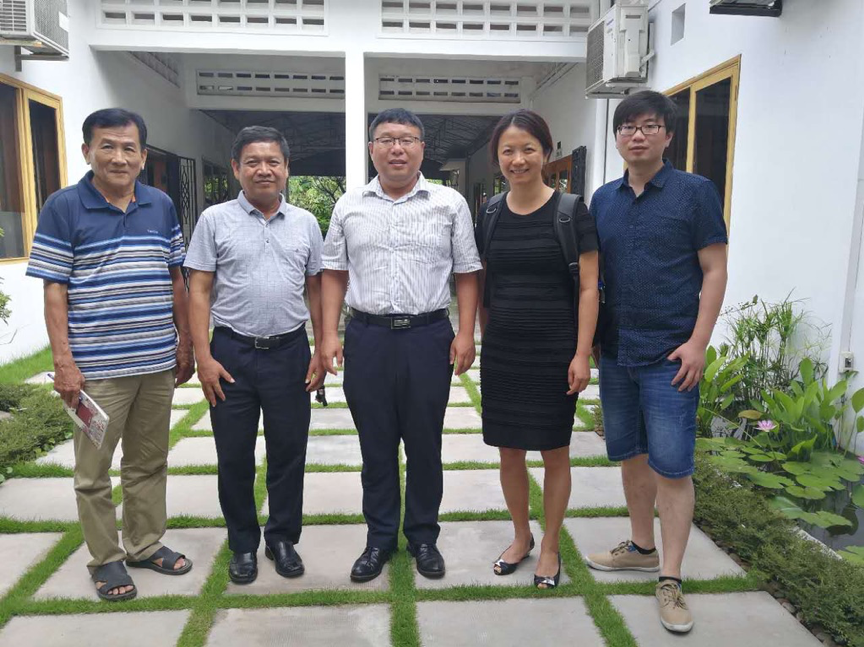On May 23, professor Junguo Liu, professor Yan Zheng and doctor MAO ganquan from the school of environment, Southern University of Science and Technology went to Cambodia to carry out the research work on the topic of "climate and water resources change in southeast Asian countries".

"Climate change and water resource in southeast Asia" is an important subject of the "pan-third pole environmental change and green silk road construction" special project of the Chinese academy of sciences. The project was jointly undertaken by the Southern University of Science and Technology, institute of Tibetan plateau, Chinese academy of sciences, institute of atmospheric physics, Chinese academy of sciences, institute of geographical science and resources, Beijing Normal University, University of Gothenburg, Sweden and six other institutions. Professor Junguo Liu from the school of environment of Southern University of Science and Technology and academician Deliang Chen from the University of Goteborg in Sweden are co-leaders of the project. Professor Yan Zheng, associate professor Luke Gibson, associate professor Xingxing Kuang, associate professor Sujong Jeong, assistant professor Lian Feng and assistant professor Masoud Irannezhad are the sub-project leaders or core members. The research topic is aimed to the “One Belt And One Road” major national requirements, closely around the pan third pole especially changes in southeast Asian countries on climate change, water resources change using the key scientific issues of ecological environment and human health effects, finely simulate the regional climate conditions and future climate change scenarios, revealing the historical evolution and climate and water resource characteristics of southeast Asian nations, clear the water change nature, humanities driving mechanism, to explore human activity disturbance to the water resource utilization and ecological environment effect, expounds the mechanism of groundwater arsenic human exposure, to have the effective prevention and control measures. These researches are all going to provide scientific basis and technical support for the security of water resources in southeast Asia and region for the “One Belt and One Road “project.
The research group conducted a field trip for water resources and environmental issues in Phnom Penh, the capital of Cambodia, from May 18 to 20. On the first day, the research institute and the Royal University of Phnom Penh, Cambodia, Cambodia Zaman international University as well as the development of Cambodia resources institute held a seminar, Junguo Liu professor and professor Yan Zheng with the other attending leaders, experts, introduced the topic and the Southern University of Science and Technology "in" environmental institute basic situation, pointed out that the team was happy to promote close cooperation between universities, research institutes and Cambodia and academic exchanges, to invite the Cambodian side to "area" environmental institute of environmental technology training. The Cambodian side also expressed a clear willingness to cooperate. Dr. Chem Phalla, research director of the Cambodia development and resources institute, visited the Cambodia development and resources institute on April 19. On May 19, the research group paid a visit to the Cambodian institute of development and resources, listened to the research work of experts from the institute on water resources, agriculture, ecological environment and other aspects, as well as the preparatory work of the Cambodia China research center, and conducted fruitful exchanges on the future international cooperation between China and Cambodia. The research group invited Dr. Phalla to visit the Southern University of Science and Technology at a later date. On May 20, the research group carried out a field investigation on the Mekong river, especially on the hydrological conditions of the four-arm bay (upper Mekong river, Tonle SAP river, lower Mekong river, and Perseus river) in the convergence zone of the four rivers.
From May 21 to May 22, a total of 18 representatives from the research group and China geological survey experts gathered in Phnom Penh, Bang Qingyang and Bodhisattva o carry out the hydrogeological research work. On May 21, Chinese representatives visited the Cambodian ministry of mineral resources and held a seminar with the ministry of mineral resources of Cambodia on "China-Cambodia hydrogeology and environmental geology cooperation survey". The seminar discussed the mode of cooperation between China and Cambodia in hydrogeology and environmental geology survey and reached an agreement on cooperation in 2018-2019. On May 22, the Chinese delegation inspected the hydrology and water quality of Tonle SAP, as well as the living conditions of fishermen. The Chinese delegation also conducted a field survey of the groundwater utilization of bodhisattva and the typical geological section of the Jurassic to cretaceous period near the bodhisattva and Bang Qingyang, laying a solid foundation for subsequent scientific research.
During the study period, the research group was also invited to participate in the recruitment of international students of Southern University of Science and Technology of China in Cambodia and discussed with the leaders of the ministry of education, youth and sports of Cambodia about the future cooperation model and mechanism of education and scientific research between China and Cambodia.
On May 23, the research team of Southern University of Science and Technology completed the survey and returned to Shenzhen. The survey not only gained new scientific understanding of Cambodia's hydrological, geological and environmental problems, but also laid a solid foundation for future scientific cooperation.